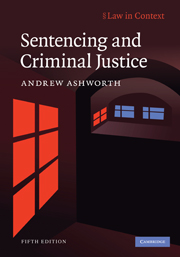Book contents
- Frontmatter
- Contents
- Preface
- Table of legislative measures
- Table of cases
- 1 An introduction to English sentencing
- 2 Sentencing and the constitution
- 3 Sentencing aims, principles and policies
- 4 Elements of proportionality
- 5 Aggravation and mitigation
- 6 Persistence, prevention and prediction
- 7 Equality before the law
- 8 Multiple offenders
- 9 Custodial sentencing
- 10 Non-custodial sentencing
- 11 Procedural issues and ancillary orders
- 12 Special sentencing powers
- 13 Conclusions
- Appendix: The Sentencing Council: provisions in the Coroners and Justice Act 2009
- References
- Index
2 - Sentencing and the constitution
Published online by Cambridge University Press: 05 June 2012
- Frontmatter
- Contents
- Preface
- Table of legislative measures
- Table of cases
- 1 An introduction to English sentencing
- 2 Sentencing and the constitution
- 3 Sentencing aims, principles and policies
- 4 Elements of proportionality
- 5 Aggravation and mitigation
- 6 Persistence, prevention and prediction
- 7 Equality before the law
- 8 Multiple offenders
- 9 Custodial sentencing
- 10 Non-custodial sentencing
- 11 Procedural issues and ancillary orders
- 12 Special sentencing powers
- 13 Conclusions
- Appendix: The Sentencing Council: provisions in the Coroners and Justice Act 2009
- References
- Index
Summary
Major changes in the sentencing field in recent years have raised several questions of a constitutional nature. To what extent does sentencing policy belong to the judiciary? Are there any limits beyond which the legislature may not go when legislating on sentencing? Where do the various bodies created to generate sentencing guidelines – the Sentencing Advisory Panel, the Sentencing Guidelines Council and the Sentencing Council – fit into the constitutional framework? What are the limits beyond which the executive may not go in determining how a sentence may be carried out? These are all live issues, but firm guidance is not always available. Sometimes the principle of judicial independence has been brought into the debate, often without sufficient clarification. These and other matters will be discussed in this chapter, taking account of their implications not only for the judiciary but also for the magistracy and for the Judicial Studies Board.
The separation of powers in sentencing
The doctrine of the separation of powers still has some relevance in British constitutional theory, but the place of sentencing has never been entirely resolved. In principle, the legislature has control over sentencing powers and policies – subject to the limitations of European Community law (see 2.6 below) and also the European Convention on Human Rights (see 2.7 below). The judiciary deals with the application of sentencing law and principles to individual offenders. The executive is responsible for carrying out the sentences imposed. But each of these propositions requires further discussion.
- Type
- Chapter
- Information
- Sentencing and Criminal Justice , pp. 51 - 70Publisher: Cambridge University PressPrint publication year: 2010



